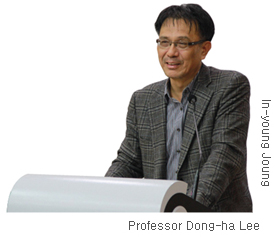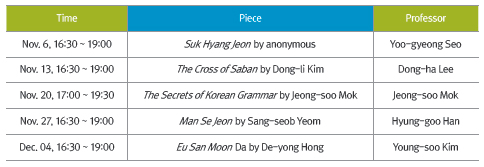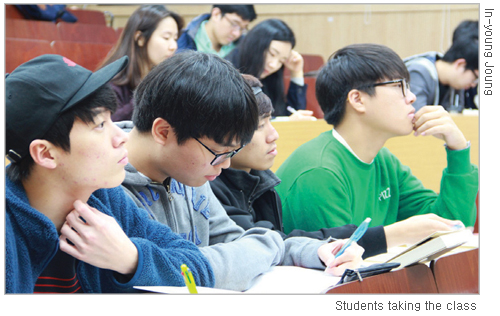
The Korean Literature Classics Reading Program is one of the extracurricular programs of the Advancement of College Education (ACE)1) initiative and administered by the department of Korean Language and Literature. Through its involvement with ACE, the UOS attempts to nurture students with two values, specialization and sharing, which are major parts of the school’s identity. Specialization indicates the highly specialized knowledge of one’s major, while sharing signifies humanistic values such as commitment to society. According to the scheme laid out by Department of Korean Language and Literature, the Korean Classics program aims to develop a specialization in Korean Literature and to serve the goals of humanistic education. However, this program is not just for students majoring in Korean Literature. The program director professor Soo-young Kim, said, “The program is not to lay another burden of lecture on students. It is designed as an opportunity to get familiar with Korean Classics.” Furthermore, Professor Kim expects them to acquire a habit of enjoying Korean Classics.

The program allows a maximum of 70 students, and any student is welcomed regardless of year or major. On November 13, the number of participants reached 65. Most of the participants were majors of Korean Language and Literature, but there were students from various majors such as Environmental Horticulture, Business Administration, and Electrical and Computer Engineering enjoyed the class. Since the classes do not require a high level of knowledge regarding Korean literature, these students of other majors are able to readily absorb the content and significance of the classes.

After all classes are over, students turn in book reviews about two works that they may choose by themselves. The department of Korean Language and Literature will award top best 15 reviewers with a bookstore gift card. According to the plan submitted by the department, the Korean Literature Reading Program is going to last for the next three years, and the applicant quota will be increased to 76 in 2018.
The Korean Literature Program does not provide pragmatic skills, but it will be a precious opportunity to have introspection and find meaning and value in life from the Korean point of view.
1) ACE is a program run by the Ministry of Education to enhance the quality of college education. The Ministry of Education has selected a limited number of universities and financially supported them for four years. The UOS was chosen as a beneficiary in April, 2015.
In-young Joung
deliverance4@uos.ac.kr

